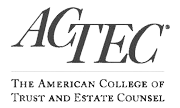Guardianships & Conservatorships
Do you have a family member who is a minor or who, as an adult, is no longer capable of making decisions regarding their health and financial affairs?
Our attorneys can assist you in establishing a court-appointed individual or professional fiduciary that is designated to make personal and medical decisions (guardian) or handle the financial planning matters (conservator) for a person who is unable to do so on their own.
Guardianships or Conservatorships are utilized for children with significant cognitive disabilities who are turning 18 years of age. They are also utilized when an adult is no longer able to make healthcare and financial decisions for themselves due to illness or injury. This may be necessary if an adult experiences a significant medical event such as a brain injury, a stroke, or with the diagnosis and progression of Alzheimer’s disease or dementia. The duties and responsibilities of a Guardian and of a Conservator are the same regardless of the reason for the need of the appointment.
Guardianship
A guardian is responsible for the health, safety, and residential placement of the protected person. A guardian is responsible to ensure that the protected person is receiving the care they need including:
- Medical care coordination
- Consent to all medical procedures including medical tests, surgeries and medications
- Residential placement based on needs and abilities
- with the guardian at their home (person with disabilities turning 18 to continue living with their parents)
- group home
- family living provider
- independent living facility
- assisted living facility
- nursing (memory care) facility
- protected person's home with supplemental care and assistance as necessary
- Managing additional services such as home health care, cooking services, cleaning services, therapies and nursing care
A guardian is not responsible for paying for any needed services or medical treatments for the protected person from their own funds, nor is the guardian generally liable for the actions of the protected person.
Conservatorship
A conservator is responsible for the protected person’s financial matters. This includes the following for the protected person:
- Collecting income or benefits
- retirement or pension benefits
- governmental benefits
- other income source
- Paying bills
- Managing financial accounts and investments
- Budgeting
- Preparing of taxes
A conservator is not responsible to pay for any needed services or medical treatments for the protected person from their own funds, nor is the conservator generally liable for the actions of the protected person.
One person or professional fiduciary can serve as both guardian and conservator for a protected person, or different people can serve in each role. Who serves in these roles is a decision typically made between the family and their attorney based on the protected person’s estate planning documents.
View more information on how the process works and what alternatives there are to Guardianship and Conservatorship, contact us today to schedule an evaluation.






